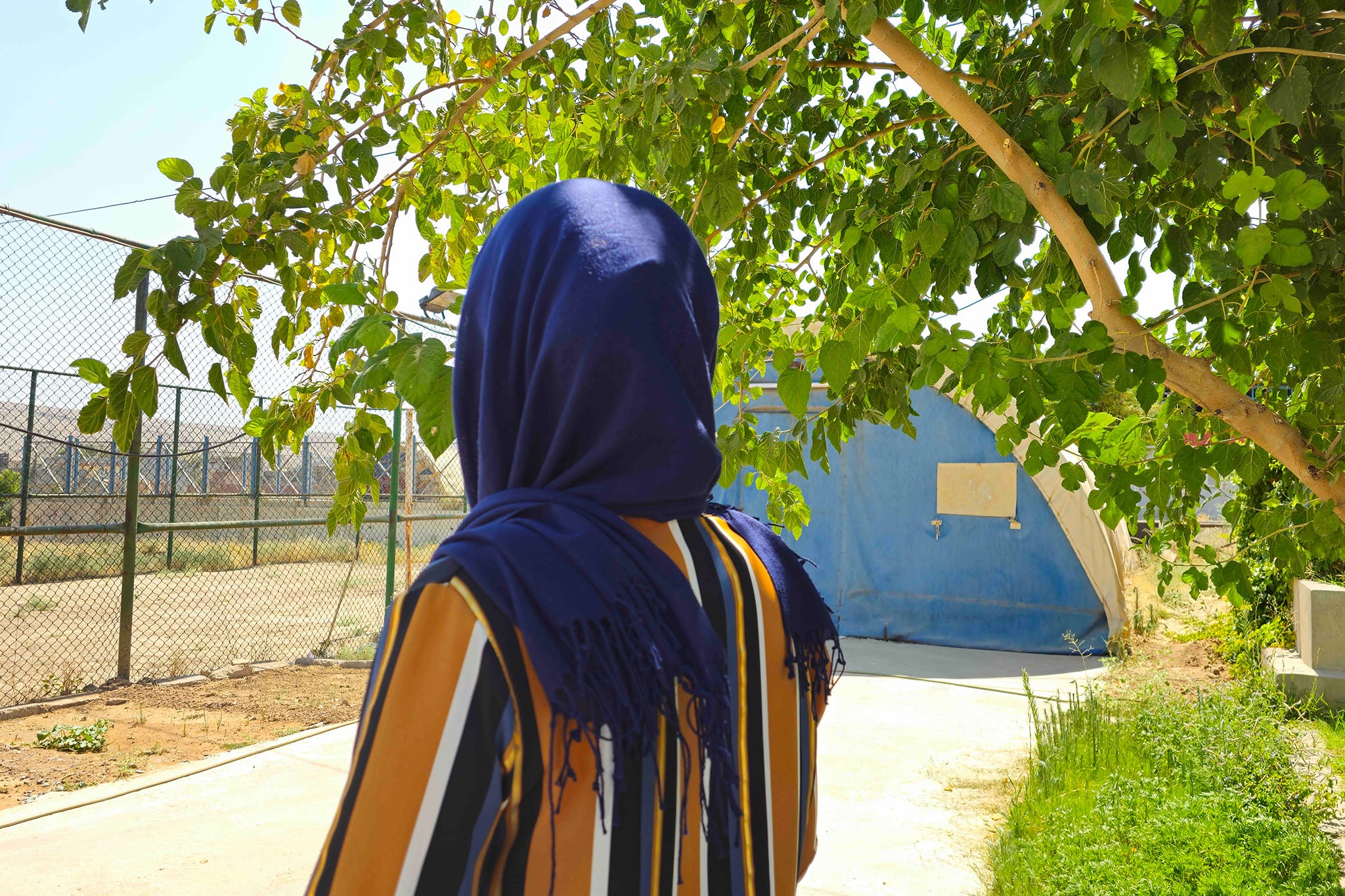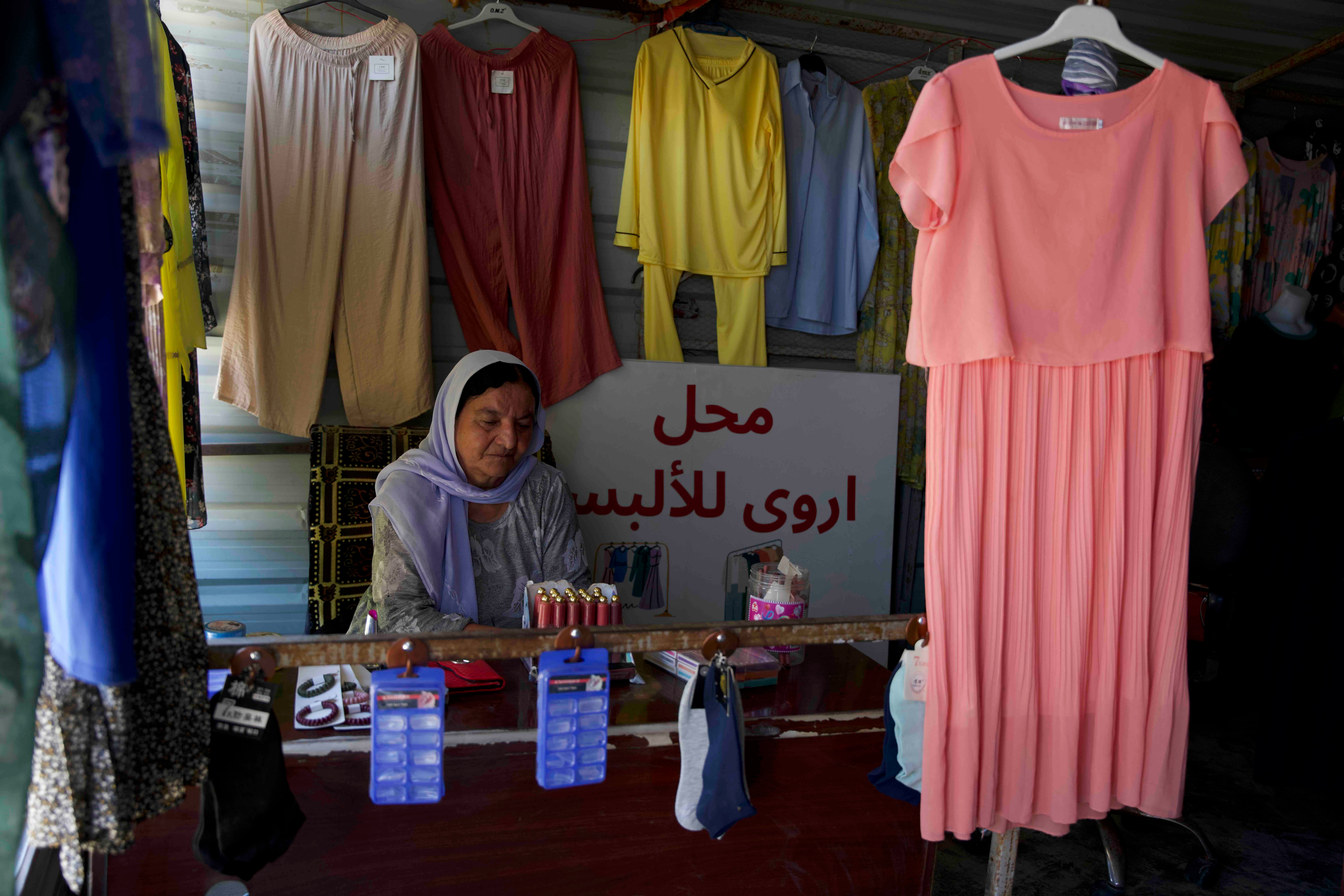She was taken captive by Isis at age 15. Now she just wants a place to call home
Hilwa* – a young Yazidi woman – was abducted during a massacre by Isis a decade ago. Rachel Hagan speaks to her about her dreams for the future in the camp for displaced people she has spent eight years in


As a teen Hilwa* dreamed of growing up and getting married. She, her sisters and neighbours would spend hours under the sun on the flat roof of their home, in a small village in Iraqi Kurdistan, sketching the perfect dress.
“I was obsessed with fashion”, she says, anxiously plaiting the tassels on her scarf repeatedly as she speaks. But now, “I can’t even wear the clothes I want to because of this,” Hilwa, a Yazidi, moves the scarf aside and lifts her shirt to show a red rash travelling from her stomach to her chest.
The young woman was 15 when Isis arrived in her hometown of Sinjar, a decade ago in August 2014. Isis killed or abducted thousands of people. Around 5,000 Yazidis were massacred and up to 7,000 women and girls were captured and sold off.
Hilwa first developed the itchy rash she calls a “skin disease” when she was in Isis captivity. Still undiagnosed, the red sores have remained for years – acting as an unwelcome reminder of all she endured.
She gives a hint of a smile as she enters the office of the non-governmental organisation (NGO) Dak, approximately nine miles south of the city of Duhok. Petrified she could be punished for speaking out, she doesn’t want to share her identity. But sitting on a plastic chair with her hair scraped back, she tells The Independent: “If I don't speak, who will speak for us [Yazidis]? Unless we speak for ourselves no one will hear us.” Her face is haunted. She has witnessed so much that a decade of pain in her eyes is almost too much to bear.
At one stage, Isis held a third of Iraq and neighbouring Syria before being pushed back by US-backed forces and militias and collapsing in 2019.

Yazidi Nadia Murad was awarded the Nobel Peace Prize for painfully telling her story in the hope of ending the use of sexual violence as a weapon of war. The United Nations and governments around the world would later recognise what happened as a genocide, but many in the area feel that justice has not yet been done for victims.
“We are worried about justice for Yazidis in Iraq. We feel year after year it is getting less important”, Sozan Ismail, president of the Dak organisation says.
Kadry Furany, the humanitarian group CARE International’s country director for Iraq, concurs. He says: “Humanitarian funding here is in sharp decline. NGOs have left the country or totally shrunk. The services that we were able to provide in the [displaced person] camps are diminishing. Health funding in particular is limiting. It’s unfair, people deserve dignity.”
Inside the Sharya camp where Hilwa lives – among many other Yazidis – small ravines at the edge of rows of tents are filled with dense piles of rubbish and colourful blankets hanging on washing lines flutter in the breeze. For eight years, Hilwa has lived in a tent with nothing from her old life but the clothes she left Sinjar in. She fled Isis captivity in the dead of night under pouring rain after 19 months. Approximately 180,000 Yazidis remain internally displaced, mostly spread across 15 camps in this semi-autonomous Kurdish region of Iraq.
Hilwa says life in the camp is monotonous and unfulfilling. The 25-year-old dreams of studying again but is now too old to attend mainstream school. “I tried to go back to school but they asked for my reports… my house is bombed, my school is bombed,” Hilwa says looking frustrated. Many Yazidis enter adulthood without any post-primary schooling.

“Other survivors were not captured, they did not see it the way I did: not knowing if I was going to live a day longer, or someone was going to do something to me, or kill me. I never believed I would hear anyone speak Kurdish in front of me again, I thought... I would die. Going through all that and coming here [the camp] and not getting enough support, makes it really difficult”, she says.
When Hilwa and her family were loaded into pickup trucks by Isis in August 2014, she was separated from one of her sisters at a checkpoint. That day would be the last time she would ever see or hear from her beloved sister again. Her whereabouts are still unknown.
Today, about 2,700 Yazidis remain missing, according to estimates from advocacy group Yazda. There are around 300 to 400 children still alive in captivity, according to numbers compiled by human rights groups. Twisting her hands over and over as she speaks, Hilwa recalls the screams of her neighbours and people being beaten with guns as they were taken by Isis.
“When we escaped we thought we would have a better life but being in the camp is really difficult,” Hilwa says. “There are no services, no support from the government, no healthcare system. Before Isis came, we never knew what psychologists and psychological issues are. Now it’s not only psychological, it's physical as well.”
Fifty-year-old Kucher is jolted awake at night by a stabbing pain in her abdomen. She has barely sat down on the coloured cushions in her tent at Essyan Camp, around 25 miles from Sharya, before she instructs her husband to go and get her medicine and prescriptions for the kidney stones. Kucher also faces high blood pressure and hypertension. The camps have poor healthcare services, pushing the Yazidi woman to resort to treatment in private hospitals in Duhok.

The medicine costs Kucher and her husband, Khuder, 53, around 70,000 Iraqi Dinar (£42). She has been told the kidney stones urgently need to be removed but they cannot afford the surgery. Their main source of income is the 170,000 Iraqi Dinar Khuder receives every two months from his pension.
Kucher recently opened a clothes shop in the camp she lives in. It’s on a small dusty road that runs through the middle of the settlements, with a barbers, more clothing stores and a small tea shop where men congregate to play board games.
The shop is made of corrugated metal and the fierce, dusty heat permeates through the roof pushing temperatures well above 50C. “I have to endure the heat otherwise we wouldn’t be able to buy tomatoes", Kucher says. The income from selling anywhere between five and 10 garments a week (with tops priced at roughly the equivalent of £3) has not only helped to bolster her husband’s pension, but has also given her a distraction from the memories of the Isis atrocities.
Earlier this year, Baghdad ordered all camps in Iraqi Kurdistan to be closed by 30 July and offered payments of around £4,000 to anyone who leaves. But Kurdish authorities refused to agree to the edict it was recently reported that the regional government had agreed with the office of Iraqi prime minister Mohammed Shia al-Sudani to postpone the closure until the end of the year.

With no source of news aside from hearsay in the camps, Kucher is desperate to know whether the camps are still closing or not. She is relieved to hear of the extension. Despite Sinjar’s deep emotional and religious significance to the Yazidi, many fear returning. Khuder misses his crop of tomatoes and cucumbers, but says if they go back to Sinjar “we will die”.
Once a place of happy memories, now Sinjar is littered with mines. Successive Iraqi governments have been unable to rebuild the town and villages despite promises to do so. The area is patrolled by various militias.
Hilwa is desperate to join her brother in Australia. Speaking about that prospect is the one time there is genuine joy in her face. She is waiting for the final interview to secure her visa, but the smile soon dissipates when she recalls friends who have been waiting since 2016 to move.
“Every day I thought it would be my last, now I live in a camp and I am grateful for surviving and being free, but life is still hard," Hilwa says. "We lack in basic services and I wish there were more opportunities for us. My wish is to live with dignity and to leave the trauma behind me."
*Name changed to protect identity
CARE International and its partner Lotus Flower offer assistance to internally displaced people. Donations can be made here
Subscribe to Independent Premium to bookmark this article
Want to bookmark your favourite articles and stories to read or reference later? Start your Independent Premium subscription today.

Join our commenting forum
Join thought-provoking conversations, follow other Independent readers and see their replies
Comments